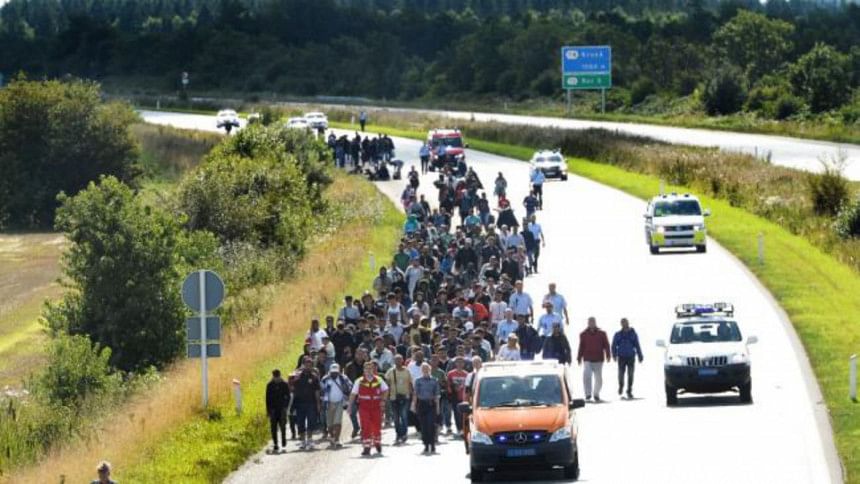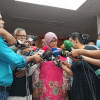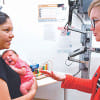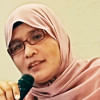From the frying pan to the fire?

If the last two centuries were of inconclusive and asymmetrical globalisation, the present one deserves to be called the century of migration. On the back of a huge migratory surge, the year 2016 may have heralded a new era for freer movement of labour along with that of capital, a long-cherished desire of dreamers of one planet, one world.
With feet on the ground now we must say that the roots of migration are bitter and the fruit still sour. But with education and enlightenment based on lessons drawn from the enormous spate in migration and management of the flows into the developed world, the fruits can eventually be sweet and wholesome.
That prospect, however, is into its painful teething time. A recent Danish legislation comes as a surprise and shock. Indeed, nothing so bizarre and measly-minded has ever been contrived by a reputably liberal country to make refugees feel exasperated, perhaps even unwelcome. In terms of a controversial bill passed in the Danish parliament last Tuesday authorities can seize money and personal belongings valued at above US$ 1450 from the asylum seekers.
The apparent reason is to get them to pay the bills for their stay in shelters. Something of a throwback in time if you recall that 'Protection' money called jijiya had been levied on non-Muslims during Mughal emperor Aurangazeb's rule.
The undisclosed reason for the 'toll' is more telling; smacking of suspicion that the so-called 'excess' money in the hands of the refugees may find its way to a 'subversive' cause. The scare of terrorism is so compelling that even increased law enforcement vigil couldn't be completely relied on, a rather sad thing to note.
The low monetary glass ceiling is not the only fetter on them, the other measure underlines the prospect for delayed family reunions, according to a BBC report.
UN secretary general Ban-ki Moon is perturbed. He wondered aloud whether the refugees deserved such treatment; especially having fled persecution and torture in their own countries and taken great pains to reach Denmark. He has even voiced concern that this could foment xenophobia, which predictably is already in evidence in some European countries.
Long adored for their open-arms policies towards migrants with a robust human face, Scandinavian countries have not only started to rethink but also react unfamiliarly to many friends of the countries.
In an unheard of move to-date, Swedish authorities have decided to expel 80,000 asylum-seekers who arrived in the country only last year. The process is to take up five years, supposedly to rhyme in with international obligations. Yet, the government will stay the full course.
Greece has received a sort of thumbs-down from the EU. The latter has asked the country, a major host to and staging post for refugees headed for onward destinations, to rectify the flaws lately detected in its entry registration processes. Athens has been given three months to complete the task failing which border controls may be reassigned to some other countries. In fact, the Schengen pact among 26 countries, widely regarded as a model for integration and free movement across the heartland of Europe, is in jeopardy. This is considered an indirect fallout of migration.
On the other hand, you have Great Britain accepting a fair number of unaccompanied children from war-torn Syria and its neighbourhood. It is kind of stating the obvious that women and children are the worst victims of wars and consequently deserving of a welcoming embrace.
In fact, the approach should be more inclusive towards the families – education for children, training and work for adults and their social rehabilitation, all rolled into a benevolent package. It is the last item on the list of to do's that is being problematic. But this will have to be overcome; otherwise pushed to the peripheries of existence the refugees could lend their ears to prejudicial messages. That is exactly the kind of prospect that the host countries would be thoughtfully and constructively avoiding. Yes, integration is a two-way traffic so that it obliges the new arrivals to be adjustable to the contextual realities.
The migrants and the hosts need to arrive at a golden mean between their respective ways of life. They must exude maximum respect for each other's culture and lifestyle.
It is mindboggling 'how saving people from drowning at sea can tie in with putting up fences' and 'pushing families away with police dogs and truncheons'.
It is also inexplicable why 'those who helped refugees in Calais have had so few organised contacts with those who do the same in Berlin'. Also virtually no one from liberal Western circles has engaged with those who believe that their nation is being 'swamped'.
Finally, the potential for intake is large enough, but it requires concrete preparations on a Pan-European basis to realise it. Only 7 percent of the European Union's population was born outside the EU and the one million refugees and migrants that arrived in Europe last year is a tiny proportion of EU's total population – only 0.2 percent.
The writer is Associate Editor, The Daily Star.

 For all latest news, follow The Daily Star's Google News channel.
For all latest news, follow The Daily Star's Google News channel. 








Comments